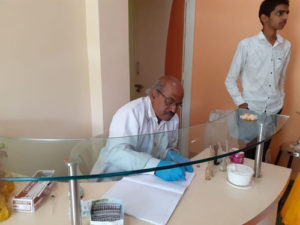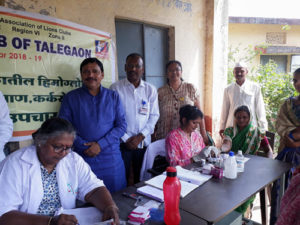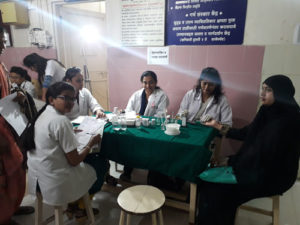
SCREENING CAMPS
Breast cancer has become one of the commonest cancers amongst women all over the world. The scenario in India is no different. A large number of new cases are being diagnosed every year. Early detection in these women can be almost curative. This can be facilitated by regular screening programs and by creating awareness of the need to go for a breast health check on a regular basis.
During the camps screening for breast cancer, cervical cancer, anemia and diabetes is done.
Breast Screening :-
Indian society is a very complex society. Most of the women do not reach the center and get their mammography done. Generally women neglect their health and there is social stigma for breast checkup. Hence we were in search for an option which can reach many women and they can get their checkup done without hesitation. Mammography is painful and the machine also is not portable. Hence we were in search of a portable, cheap and acceptable device.
After finding the IBE machine we compared its screening with mammography and once we were satisfied with the results, we started conducting screening camps by IBE machine.
VIA (Visual inspection with Acetic acid for cervical health) :-
VIA is an effective screening test for cervical cancer. Acetic acid is used to enhance and mark the ace to white change of a precancerous union or actual cancer. Differences in precancerous cell proteins make the abnormal cells temporarily appear white when exposed to vinegar. Results of the test are available immediately and do not require lab support.
The sensitivity and specificity of the test is favorable for use as a screening test and can be easily used to train health care workers to conduct in camping setting too.
The findings are then explained to the beneficiaries and they are further referred to gynecologist for treatment.
Anemia and Diabetes :-



Blood tests done in screening camps :-
We conduct cancer screening camps for women in different strata of society. Women often spend so much time helping others that they don’t take time for themselves.
In these camps we test their Hemoglobin and blood sugar also.
Hemoglobin :-
Anemia affects over 800 million women worldwide. In India, it is classified as a major public health problem as it is estimated that 52% of no pregnant women of reproductive age are anemic .
The hemoglobin test measures how much hemoglobin is in your blood.Hemoglobin is a protein in your red blood cells that carries oxygen to your body’s organs and tissues and transports carbon dioxide from your organs and tissues back to your lungs. The iron contained in haemoglobin is also responsible for the red colour of blood.
The normal range for hemoglobin is:
For men, 13.5 to 17.5 grams per deciliter.
For women, 12.0 to 15.5 grams per deciliter.
Young women are likely to have low-grade iron deficiency anemia because of the loss of blood each month through normal menstruation.
Although the primary cause of anemia is iron-deficiency. More frequently it coexists with a number of other causes, such as loss of blood (traumatic injury, surgery, bleeding, colon cancer, or stomach ulcer), malaria, parasitic infection, nutritional deficiencies,(iron, vitamin B12, folate and haemoglobinopathies.
Some patients with anemia have no symptoms. Those who do have symptoms may
feel tired,become easily fatigued,appear pale,Hair loss,feel short of breath, and/or
have worsening heart problems.
The women with low values are referred to doctors. We guide them about healthy iron rich diet also.
Anemia treatment varies greatly and depends on the particular cause.
BLOOD SUGAR :-
Diabetes is a chronic disease caused by deficiency of insulin production by the pancreas resulting in high levels of blood sugars.There are two main types of diabetes, type 1 and type 2.
Diabetes is a growing challenge in India with estimated 8.7% diabetic population in the age group of 20 and 70 years. The rising prevalence of diabetes and other noncommunicable diseases is driven by a combination of factors – rapid urbanization, sedentary lifestyles, unhealthy diets, tobacco use, and increasing life expectancy.
Obesity and overweight are the most important risk factors responsible for diabetes. Much of the diabetes burden can be prevented or delayed by behavioral changes favoring a healthy diet and regular physical activity.
There are diabetes warning signs and symptoms that both women and men have in common, for example:
Excessive thirst and hunger
Frequent urination (from urinary tract infections or kidney problems)
Weight loss or gain
Fatigue
Irritability
Blurred vision
Slow-healing wounds
Nausea
Skin infections
Darkening of skin in areas of body creases (acanthosis nigricans)
Breath odor that is fruity, sweet, or an acetone odor
Tingling or numbness in the hands or feet
We check the random sugar of the beneficiaries in the camp and if it is above the limit we refer them to the concern doctor.
Due to these checking of blood parameters many unknown cases of diabetes and Anemia are Diagnosed.

